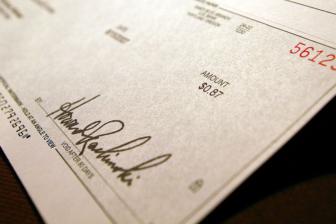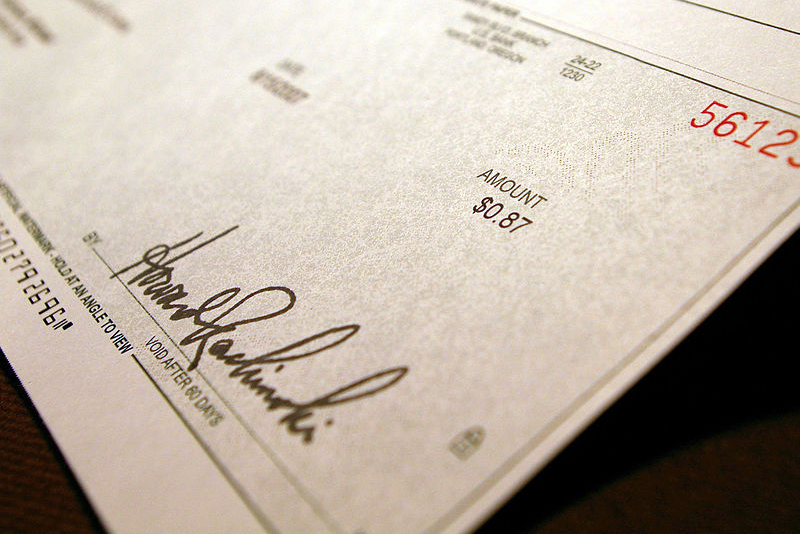An 18-year-old Norwalk Community College student lost $700 last week to two men who used a classic scam, sometimes called a “fake check scam,” that’s probably several times older than the victim.
The scammers knew what many people don’t: You can cash a check at your bank and walk away with the money, whether or not there’s money in the account named on that check. The bank, which doesn’t immediately check the other account, expects the bank’s customer to make up the difference if there’s insufficient funds — or no funds at all — to back up the check.
On Wednesday, Nov. 29, a Fairfield man walked into Darien Police Headquarters to report the fraud. He said that when he was in a lobby at the college on Tuesday, a male approached him and said he needed to pay off a “financial aid” bill, and he wanted to see if the student could help him.
He asked to use the student’s checking account, depositing some checks in it and getting money back to pay the college.
In similar scams reported to Darien police, the scammer contacts the victim over the Internet or by phone, never seeing the victim, and the victim never seeing the scammer.
In this case, that didn’t happen, and the victim not only saw the scammer, but also an associate who drove a car — a four-door Chevrolet — to a bank branch just over the border from Norwalk: TDBank at 55 Post Road in Darien.
Here’s how police describe the suspects:
- Suspect No. 1 was described as a black male with a hooded sweatshirt, backpack, jeans and a black baseball hat. Suspect No. 2, who remained in the vehicle the entire time, was also a black male and was described as being dressed similarly.
Security cameras at the bank also would have seen the scammer, although police didn’t mention that in a news release Friday afternoon. The bank also got a check that might have one of the scammer’s fingerprints on it.
The victim and the scammer went to an ATM at the bank, where the victim entered his PIN and the scammer deposited two checks totaling $1,800. He then made three withdrawals totaling $700 from the account. Then the two subjects drove the student back to the college, dropping him off there.
The two checks were from a closed account.
The victim said he didn’t think either of the suspects are students at the school.
Police added:
- This incident remains under investigation and no further information is being released at this time. If anyone has any information regarding this incident please call the Darien Police Department at 203-662-5300.
See also these similar scams from Darien police reports:
- Darien Police: Don’t Fall for Overpayment Scam in Online Car Selling (April 29, 2016)
- Darien Woman, 25, Taken in Internet Scam with Added Twist (Nov. 19, 2016)
- Police: Darien Teen Gets Close to Being Scammed in Summer Job Scheme (May 16)
- How a Darien Man Was Scammed with a Variant of a Widespread Check Deposit Scheme (July 21)
More About Check Deposit Scams

Photo by Michael Kooiman on Flickr (via Wikimedia Commons)
A check (for quite a bit less than a typical fraud)
Here’s some advice Darienite.com previously published:
Under federal law, according to the Federal Trade Commission, banks are required to make money available from deposited checks within days — but it may take as long as weeks for a bank to discover that a deposited check is fraudulent.
The bank isn’t liable for what the law requires it to do. You — the person who deposited the check — are liable. If you become a victim, the con artist knew about this, but you didn’t: It’s your responsibility to know if the check you deposited is genuine before using the money.
The Federal Trade Commission’s blog about scams regularly features posts about this kind of scam. One post discusses how this kind of scam occurred with con artists using a website for babysitters and nannies.
One post has this description of the “fake check scam” and simple advice to keep you from getting victimized:
Fake checks drive many types of scams – like those involving phony prize wins, fake jobs, mystery shoppers, online classified ad sales, and others. In a fake check scam, someone asks you to deposit a check – sometimes for several thousand dollars – and, when the funds seem to be available, wire the money to a third party.
The scammers always have a good story to explain the overpayment – they’re stuck out of the country, they need you to cover taxes or fees, you’ll need to buy supplies, or something else. But when the bank discovers you’ve deposited a bad check, the scammer already has the money, and you’re stuck paying the money back to the bank.
So don’t deposit a check and wire money or send money back in any way.


